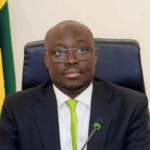
Government is taking steps to reassure investors, donors, and the markets that fiscal discipline will be maintained after Ghana exits the International Monetary Fund (IMF) programme in May 2026.
Concerns have been raised that the country could slip back into unsustainable spending once the programme ends.
But government sources told Joy Business that such fears are unfounded, insisting that Ghana’s current performance under the IMF arrangement demonstrates a firm commitment to prudence.
To further strengthen investor confidence, officials say government is considering subscribing to one of the IMF’s policy instruments, though not a full programme.
This, they argue, would serve as an additional signal of stability and ensure markets remain confident that fiscal discipline will not unravel.
The move follows arguments by some donors that Ghana’s recent macroeconomic recovery has been driven mainly by the IMF’s oversight.
One government official, however, rejected this claim, stressing that the current fiscal checks are the result of deliberate policy choices and not merely IMF enforcement.
Market watchers remain cautious. Ratings agencies are said to be factoring in the risk of post-IMF slippages in their upcoming assessments of Ghana’s creditworthiness.
Analysts describe the ability to sustain discipline beyond May 2026 as one of the biggest challenges facing the government, especially after President John Mahama announced that the current programme will not be extended.
Meanwhile, an IMF staff mission is expected in Accra at the end of September 2025 for the fifth review of Ghana’s programme.
This penultimate review, following the fourth assessment earlier this year, will evaluate Ghana’s economic data up to June 2025. The final review is scheduled for April 2026.
According to Joy Business sources, the review will focus on key indicators, including inflation performance, reserve sustainability, fiscal revenue shortfalls, arrears audits, and challenges facing state-owned and private banks in need of recapitalisation.
Particular attention will also be given to arrears in statutory funds such as the NHIL, GETFund, and Road Fund, as well as gaps in social spending.
The IMF programme, approved in May 2023 under a 36-month Extended Credit Facility (ECF) worth about $3 billion, has been critical in stabilising Ghana’s finances.
Its key priorities include restoring public finances through improved revenue mobilisation and spending efficiency, expanding social protection, implementing structural reforms in taxation and public financial management, addressing weaknesses in energy and cocoa, and tightening monetary policy to control inflation.
While donors have urged government to build “shock absorbers” to maintain stability after IMF support ends, officials insist Ghana’s commitment to discipline is genuine and long-term.